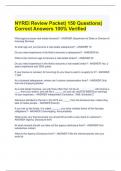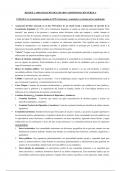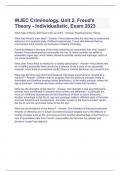Steven J. Heine
INTRODUCTION TO CULTURAL PSYCHOLOGY
Universiteit van Amsterdam, semester 2, year 19/20
Second INTREM EXAM
Chapter 6 – Self and personality
Chapter 8 - Motivation
Chapter 9 – Cognition and perception
Chapter 10 – Emotions
Chapter 11 – Interpersonal attraction and close relationships
,CHAPTER 6 – SELF AND PERSONALITY
=> Culture defines: the degree to which people view themselves as a) abstract psychological
attributes/enduring inner attributes or b) concrete roles and relationships/connections with others
Both lead to different patterns of brain activity
Consider in terms of roles -> leads to more thinking about other’s people when thinking
about social roles
Views on the self
* Independent (Western) = the self can be thought to derive its identity from its inner attributes
These attributes reflect an inner essence of the individual, because:
o They are the basis of the individual’s identity
o They are stable across situations and lifespan
o They are unique
o They are self-contained (arise from individual’s interactions with others)
o They are significant for regulating behavior
o They are advertised with by individuals towards others
- Independent individuals experience their identities largely distinct form their relationships
- Important self-defining aspect of identity lie within the individual
- The self is bounded and stable (solid border around the individual)
- The border between ingroup (close relations) and outgroup (distant relations) is fluid ->
easily to move between them
*Interdependent (e.g. Asian) = the self can be viewed as a relational entity that is fundamentally
connect to, and sustained by, a number of significant relationships => individuals are entities in a
larger social unit
- Behavior is recognized as contingent upon perceptions of others’ thoughts, feelings and
actions -> always consider how your behavior affects others + organize your experiences in
response to what others are thinking and doing
- The border surrounding the interdependent self overlaps with an individuals significant
relationships -> individuals are not distinct, unique entities
- The key aspects of identity rest at the intersection between the individual and significant
relationships -> identities are grounded in relationships with others
- Identity of the person is experiences somewhat fluid in different situations
- The border that separates the ingroup from the outgroup is solid, there is a stable distinction
=> In the brain: interdependent use same part for representations of the self and other (independent
people use different parts)
Relationships (with ingroup) -> are of special significance among interdependent views, because are
critical for self-definition + serve to direct appropriate behaviors
- Becoming a member of ingroup of interdependent people is more difficult
- Independent people:
o Are more willing to form new relationships
o Maintain larger networks of relationships
o Are less distressed if relationships fade over time
, -> Cultural practices are partly shaped by the kinds of self-concepts a culture’s members have =>
culture and self make each other up
* Individualistic cultures = people in these cultures are more likely to elaborate on independent
aspects of themselves and feel distinct form others and emphasize the importance of being self-
sufficient
* Collectivistic cultures = people in these cultures are more likely to attend to interdependent aspects
of their self-concepts, e.g. their close relationships and group memberships
-> Periods of economic growth can be linked with growing rates of independence (and recessions
with increasing interdependence)
! There are also other dimensions that differ between cultures
- But individualism-collectivism has the highest power and empirical support to distinguish
cultures (but other dimensions is not that much research in yet)
! People cannot be categorized cleanly to an independent or interdependent self => the experience
of the self follows a continuum (have aspects of both)
- People experience more independent or interdependent situation depending on the culture
they live in -> thus that part of the self is more frequently encountered
Gender: woman are more interdependent and men more independent identities -> this only
accounts for the fact that woman have more attention to other’s feelings and concerns (relatedness)
- Might also just be a result of particular cultural practices
* Gender equality:
There are strikingly different views toward gender equality around the world
Regardless of where data is collected, within a culture men and women tend to share fairly
similar views about gender equality -> attitudes towards gender equality are part of the
cultural discourse and shape of people’s views in a culture
Almost always males have significantly more traditional gender views than females (because
traditional gender views benefit men more than women)
Variables that influence gender views: religion, geographical location, how urbanized the
country is on average (not clear if this are causes or consequences)
Historical take: using plow cultivation (working with large animals to pull the plow) leads to
gender differences, because needed to be done by men -> you can still see the influence of
this today, regions which used plow cultivation are less egalitarian today
* Essentialism = e.g. gender identity is thought to reflect an underlying unchangeable essence -> the
gender that is more essentialized has less flexible ways of being expressed in socially approved ways
In America: male is more essentialized -> woman can do male stereotype things, but not the
other way around
Mostly the gender that is associated with more power in a culture is the one to be
essentialized
=> How do cultural differences in independent and interdependent self-concepts lead to other
differences in ways of thinking about the self:
* Self-consistency = doe we think and behave the same across different situations (and in different
relationships)
Americans are more self-consistent than Japanese (they are less self-critical when alone)
Cognitive dissonance = we have a powerful motivation to be consistent and cognitive
dissonance is the distressing feeling we have when we observe ourselves acting
inconsistently, such that we feel a great need to rid ourselves of is, this by:








